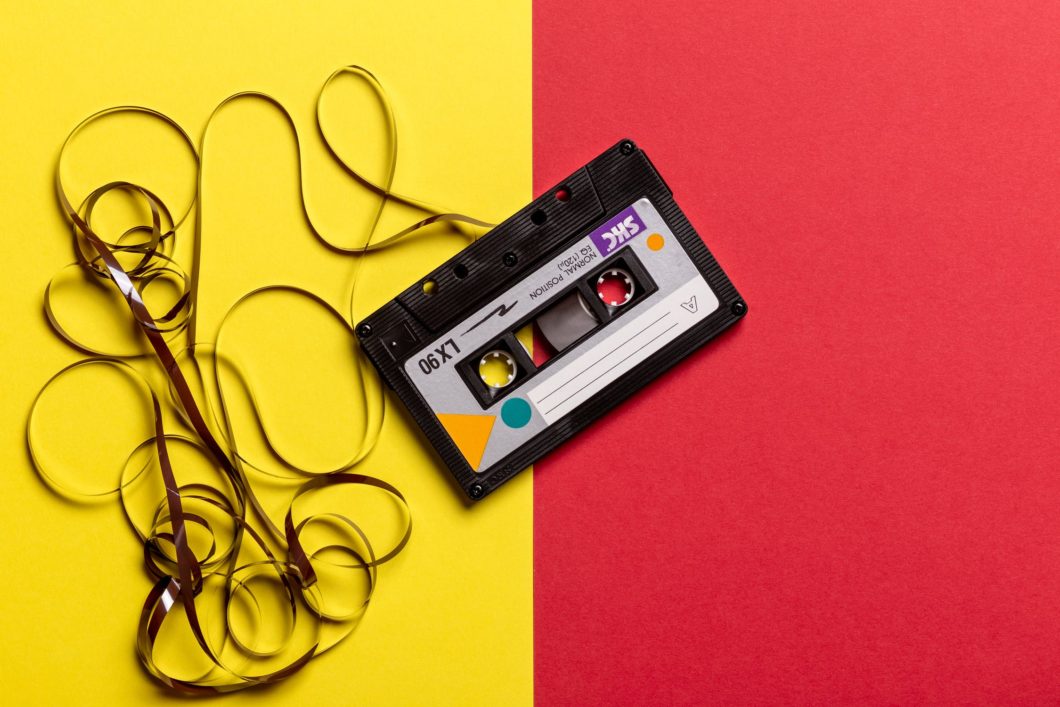Sometimes I look at the date and think, “What happened there, then?” It’s 2020!
We are seriously in the future now.
Yep – we are now in a time AFTER Back to the Future 2, 2001: A Space Odyssey, Barb Wire (don’t ask), Blade Runner, Robocop and … er … 1984. Obviously.
And if you think about it, it shows.
Look at all the stuff we’ve managed to invent, create and discover over the last hundred years or so. It’s awesome
But of course, when new things get invented, or when old things get an upgrade, it can play havoc with the language.
I mean, what do we call this new thing?
And if the new thing is just a newer version of an old thing, what do we call the new thing now? And the old thing?
Sometimes the new thing gets the old word, and the old thing gets a new name.
Fair?
No – probably not. But that’s language!
Welcome to the world of retronyms!
It seems to me that retronyms fall under two broad categories, which I’m going to label technological retronyms and societal retronyms.
This makes sense, right?
Retronyms all happen because of change.
And the two biggest changes that have happened over the last hundred years or so have either been technological or societal.
Let’s check out the technological ones first.
Technological retronyms
1. Snail mail
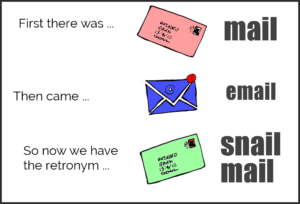
Mail → email → snail mail
For centuries, whenever we sent someone a message, we were happy to wait between a day and several months for a response.
It was a more patient and more verbose time.
And that was how we understood the concept of mail.
And it was fine.
Then we got email. And everything changed!
Now, when we talk about mail, we usually mean email.
So what do we call the other type of mail (that still, for some reason, exists)?
We created the retronym, “snail mail.”
- Example:
“Yeah! We’ve started writing each other letters! Like it’s the ‘90s – using snail mail and everything!”
2. Quill
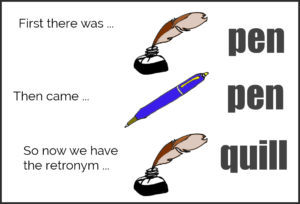
Pen (as a feather) → pen (with a metal head) → quill
This one’s not fair.
Why?
Because the word “pen” actually comes from the word “penna,” which is Latin for “feather.”
But now we use that word to describe something that’s definitely not a feather, and we’ve adapted a really obscure, old Germanic word, “kil,” (which meant “feather”) to use instead.
It’s like someone taking your Super Nintendo Entertainment System from you and giving you a Nintendo Entertainment System.
Am I showing my age there?
Life is hard sometimes.
- Example:
“Look! He’s writing with a quill! That’s so hipster!”
3. Landline
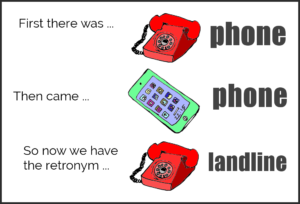
Phone → mobile phone (U.S. cell phone) → landline
Phones!
We’ve been using them since the 19th century, ever since Alexander Graham Bell called his assistant, Watson, in the room next door and said, “Mr. Watson, come here. I want to see you.”
Then, about 100 years later, mobile phones came along.
People got so used to using them that we just started calling them phones.
So what about the other phones – you know, the ones that always stay in the same place?
They’re called landlines or landline phones.
- Example:
“Yeah – I lost my phone. Can you call me on my landline?”
4. Wristwatch / analogue watch / pocket watch
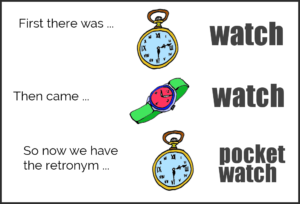
Watch → wristwatch → pocket watch
Watch → digital watch → analogue watch
Watch → phone → nothing matters anymore
First, there were massive clocks!
Then there were watches that we put in our pockets.
Then things got more complicated.
Someone invented a watch you could put on your wrist.
At first, they were called wristwatches, and the old ones – the ones you put in your pocket – got a retronym: pocket watches.
And then we just started calling wristwatches watches.
Then someone invented digital watches.
So the older wristwatches got called analogue watches.
But now that we have phones, this doesn’t really matter anymore, does it?
- Example:
“Oh … he really is a hipster! Look! He’s got a pocket watch!”
5. Acoustic guitar
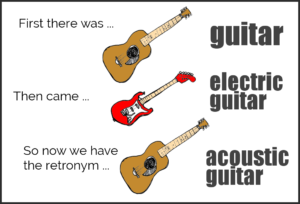
Guitar → electric guitar → acoustic guitar
You’re starting to see a pattern, right?
There were guitars, which were just guitars.
Then the electric guitar came along, and now we need to differentiate between acoustic guitars and electric guitars.
- Example:
“I started on the acoustic, but when I was 15 my dad got me an electric.”
6. Railroad car (American English), Carriage (British English)
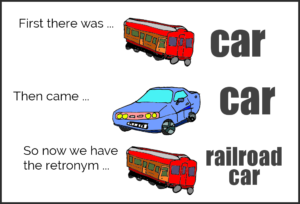
Car → car → railroad car (American English)
Car → car → carriage (British English)
Carriage → carriage (for a train) → horse-drawn carriage
This one can be a little tricky.
Back in the 1800s, we had cars. But not the kind you’re thinking of.
They were train cars, and they were basically where you put the goods (or people) that you were transporting for your train company. Because you totally had a train company back in 1885, right?
Then we got cars … the other kind.
You know, the ones that now rule our cities. Cars! Normal cars!
So what happened to the “car” we used for the trains?
Well, in the US they became train cars. Which makes sense.
In the UK they became carriages. Which makes less sense, as we were already using that word to describe the room on wheels that horses pulled people around in. You know … before we had … cars.
So now we have another retronym for them: horse-drawn carriages.
My head hurts.
- Example:
“Please use the front four carriages for stations between Uxtable and Collingsworthby Bridge.”
Societal retronyms
But it isn’t just the world of technology that’s seen all this dramatic change.
Our society has evolved so much – not just in the last century, but even in the last 30 years.
How we interact with each other, what we eat … it’s all so different now.
7. World War I / The First World War
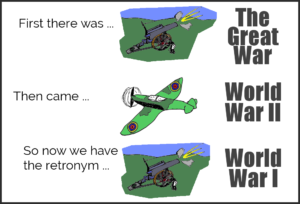
The Great War →The Second World War → The First World War
OK – let’s get the dark, nasty stuff out of the way first.
The reasons the two world wars are called world wars are quite complicated, but essentially it’s got a lot to do with massive powers losing their empires and the fact that so many people got killed.
When the first one came along, they didn’t call it the First World War – that would’ve required an impressive capacity for foresight.
It would also have got people pretty depressed.
At the time, it was called the Great War.
In fact, with a serious lack of foresight, H. G. Wells termed it “the war that will end war.”
But then, proving Wells very wrong, the Second World War erupted a couple of decades later.
So now, with two “great wars,” the first was called the First World War and the second one the Second World War.
- Example:
“You have to watch 1917 – easily the best film about World War I ever!”
8. Business partner
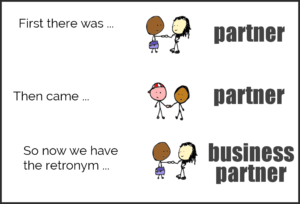
Partner → partner (couple) → business partner
OK – so if I say, “Hey, meet Alex. She’s my partner,” what would you think?
Most people’s first assumption would be that Alex and I are in a relationship – that we live together and brush our teeth together and stuff.
If I said the same thing 50 years ago, most people would’ve assumed that I’m in business with Alex, and we run some sort of company together.
With society changing, and same-sex couples (another retronym there) and non-binary genders becoming more and more integrated into society, people have started using the term “partner” instead of “girlfriend,” “boyfriend,” “wife,” “husband,” etc.
So where does that leave the partner you do business with?
It leaves them with a retronym. That’s what.
- Example:
“I’m meeting Jan later today. You know Jan, yeah? He’s my new business partner.”
9. Tap water
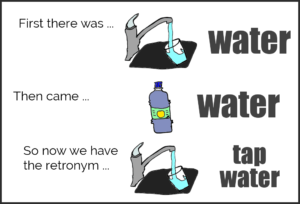
Water → bottled water → tap water
One thing I’ve noticed is that there are a lot of retronyms that have come into being as a result of our changes in diet.
And it makes sense if you think about it – our attitudes to food have changed so much over the last few decades.
Once upon a time, water just used to be called water.
I suppose there would’ve been a distinction between the water you can drink and the water that will definitely make your eyes green and your hair fall out.
Probably “drinking water” and “stay the hell away from THAT water.”
But all drinking water? Basically just water.
Then, for some reason, a trend developed for water in plastic bottles.
Water advertised as “fresher,” “cleaner” and “more watery” than the water you get from your tap.
So another retronym was born: tap water.
- Example:
“Listen, mate. If you want to use to the toilet, you’re going to have to buy something. You can’t just order tap water.”
10. Coffee
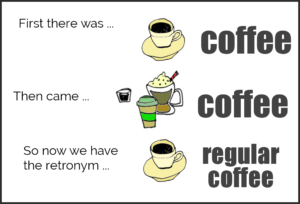
Coffee → decaf, americano, espresso, latte and the other 12,000 types of coffee we have → regular coffee
You know something’s becoming popular when the mafia are getting in on it. Here’s an article from the Guardian called ‘Coffee Is The New Racket’.
Like water, there was a time that you could go to a cafe and order a coffee without being bombarded by an assortment of questions.
Coffee is such a big industry now that just asking for a coffee isn’t enough anymore.
You have to ask for a regular coffee … if that’s what you want.
- Example:
“No, I don’t want syrup, or milk, or Amazonian tree bark. I just want a regular coffee!”
11. Corn on the cob
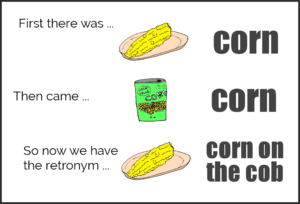
Corn → canned corn → corn on the cob
This goes back pretty far.
But way back in time, we would get most of our food pretty locally. We might’ve even personally known the people who made it.
There was no need for packaging or canning or anything like that.
Corn was no exception.
Someone would pull it out of the ground and then give or sell it to us, and that’s how we’d get it.
Then, as capitalism evolved and the gap between the producer of the food and the consumer of the food got larger, we got canned corn – corn in a can.
So what did we do to differentiate canned corn from the stuff straight out of the ground?
One was just “corn” (the canned kind) and the other became the ever-quirky corn on the cob.
- Example:
“Istanbul’s awesome for street food. Corn on the cob’s a big thing there. Cheap, too.”
And there we have it – retronyms aren’t just about language.
They tell the story of change – change in our society, change in technology and change in our relationships to food.
Did you enjoy reading this post?
If so, you might also like the following articles.
- 10 Contronyms
- 12 Meronyms
- 12 Heteronyms
- 13 Eponyms
- 15 Heterographs
- 16 Capitonyms
- 36 Acronyms
- Exonyms & Endonyms
Gabriel Clark, LOS Consultant & Clark and Miller Co-founder
